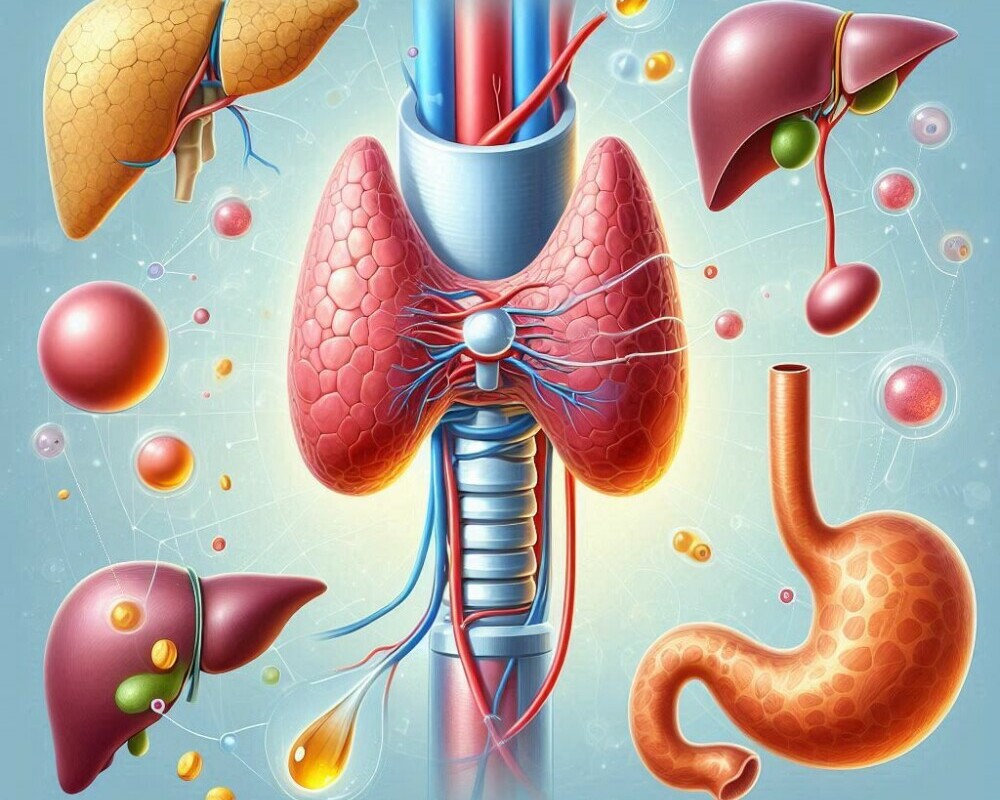Introduction to Hormones and Their Impact on Our Bodies
Definition of hormones
Think of hormones as tiny messengers in your body, travelling through your bloodstream to tell your organs and tissues what to do. They’re chemicals produced by the endocrine system, and they play a crucial part in regulating everything from your mood to your metabolism.
Major hormones and their functions
In my opinion, to really grasp how hormones govern body activities, it’s essential to know about players like insulin, cortisol, and adrenaline. Insulin, for example, helps regulate your blood sugar levels, while cortisol is tied to your stress responses.
Balance of hormonal levels
 It’s not just about how much of a hormone is produced; it’s also about balance. Too much or too little can lead to health issues, such as diabetes or thyroid disorders. This balance is so intricate that even slight shifts can have profound effects.
It’s not just about how much of a hormone is produced; it’s also about balance. Too much or too little can lead to health issues, such as diabetes or thyroid disorders. This balance is so intricate that even slight shifts can have profound effects.
You’re going to find out about how these secretions not only dictate how you feel on a day-to-day basis but also play a long-term role in maintaining your health. Let’s not overlook the hormones that drive growth and reproduction, shaping stages of life from puberty to pregnancy and even ageing.
Now that we understand the foundational role hormones play, let’s delve into the intricate dance they perform with metabolism. This relationship is pivotal, affecting how we process food, our energy levels, and even our ability to maintain a healthy weight.
The Intricate Dance of Hormones and Metabolism
Relationship between hormones and metabolism
 Think of hormones as messengers in your body, coordinating complex processes like growth, metabolism, fertility, and even how your body uses the energy it gets from food. Metabolism, in particular, is a series of chemical reactions that the body relies on to survive, and it’s under hormonal control. Hormones are directly involved in increasing or decreasing metabolic rate, depending on your body’s needs.
Think of hormones as messengers in your body, coordinating complex processes like growth, metabolism, fertility, and even how your body uses the energy it gets from food. Metabolism, in particular, is a series of chemical reactions that the body relies on to survive, and it’s under hormonal control. Hormones are directly involved in increasing or decreasing metabolic rate, depending on your body’s needs.
Hormonal imbalances and body weight and energy levels
When it comes to body weight, the balance between food intake, energy expenditure, and energy storage is critical, and this balance is significantly influenced by hormones such as insulin, glucagon, and leptin. Insulin, for example, helps cells absorb glucose for energy or storage as fat. An imbalance in insulin levels can lead to issues like diabetes. Meanwhile, leptin tells your brain when you’ve had enough to eat. If this system isn’t working properly, it can result in overeating and weight gain.
Thyroid hormones in metabolic
 Your thyroid gland, nestled at the base of your neck, orchestrates your metabolic speed with thyroid hormones. Low levels of thyroid hormones can slow down your metabolism, causing weight gain and a lack of energy, while high levels can have the opposite effect, making you feel anxious and causing weight loss. It’s like the thermostat of your body, and if it’s not set right, you can really feel out of sorts.
Your thyroid gland, nestled at the base of your neck, orchestrates your metabolic speed with thyroid hormones. Low levels of thyroid hormones can slow down your metabolism, causing weight gain and a lack of energy, while high levels can have the opposite effect, making you feel anxious and causing weight loss. It’s like the thermostat of your body, and if it’s not set right, you can really feel out of sorts.
Suppose you’re experiencing symptoms such as constant fatigue, unexpected weight changes, or mood swings. In that case, it may be worth discussing with a healthcare provider, as these could be signs of a hormonal imbalance affecting your metabolism. By understanding these signals, you can take proactive steps to maintain your hormonal health.
Hormones and Physical Activity – A Symbiotic Relationship
The effects of exercise on hormonal release and regulation
 You’re going to find out about how exactly physical activity influences your hormonal landscape. When you start moving, your body goes into action mode, and hormones are the directors of this complex physiological play. For instance, engaging in exercise prompts the release of insulin-like growth factor (IGF-1), which helps with muscle repair and growth.
You’re going to find out about how exactly physical activity influences your hormonal landscape. When you start moving, your body goes into action mode, and hormones are the directors of this complex physiological play. For instance, engaging in exercise prompts the release of insulin-like growth factor (IGF-1), which helps with muscle repair and growth.
Physical activity’s role in balancing stress hormones
 Another aspect you might not have considered is how exercise can be a powerful tool for keeping stress hormones, such as cortisol, in check. While cortisol is necessary for responding to daily stress, too much of it can wreak havoc on your body. Fortunately, regular physical activity has been shown to regulate cortisol levels, helping you stay calmer and more collected.
Another aspect you might not have considered is how exercise can be a powerful tool for keeping stress hormones, such as cortisol, in check. While cortisol is necessary for responding to daily stress, too much of it can wreak havoc on your body. Fortunately, regular physical activity has been shown to regulate cortisol levels, helping you stay calmer and more collected.
Endorphins and exercise
Let’s not forget about endorphins, your body’s natural painkillers. They are also known to elevate mood, and that’s why so many people swear by the ‘runner’s high.’ This phenomenon is a perfect illustration of the positive feedback loop between physical activity and hormones: you exercise, endorphins are released, you feel good, and you want to keep exercising.
Transitioning from understanding the bonding between hormones and physical activity, it’s time to focus on practical applications. I’m going to shed some light on how you can leverage your lifestyle choices to manage your hormonal health effectively.
Managing Hormonal Health Through Lifestyle Choices
The impact of diet on hormone levels
 Now, you’ve learned how hormones interact with physical activity to help your body thrive. But that’s not the whole picture. It’s also about the daily choices you make. What you eat, how much you sleep, and your stress levels all play roles in your hormonal health.
Now, you’ve learned how hormones interact with physical activity to help your body thrive. But that’s not the whole picture. It’s also about the daily choices you make. What you eat, how much you sleep, and your stress levels all play roles in your hormonal health.
Choose something that resonates with you when it comes to diet. Certain foods can either spike or stabilize your hormone levels. For instance, refined sugars may cause a rollercoaster in your insulin levels, while fibre-rich foods like lentils can help maintain them. Include plenty of omega-3s, found in fish and flaxseeds, to support hormone health.
Sleep’s influence on hormonal balance
 Don’t worry too much about missing an occasional night’s rest, but consistent good sleep can work wonders on your hormones. Aim for 7-9 hours a night. A dark, cool room without screens is best for encouraging the sleep hormone, melatonin, to do its job.
Don’t worry too much about missing an occasional night’s rest, but consistent good sleep can work wonders on your hormones. Aim for 7-9 hours a night. A dark, cool room without screens is best for encouraging the sleep hormone, melatonin, to do its job.
You can always adjust your approach down the road, but start by finding methods to tackle stress. Yoga, meditation, and even simple breathing exercises can help regulate stress hormones such as cortisol and adrenaline.
The importance of regular physical activity
 In my opinion, you’re in the driver’s seat when it comes to your health. By paying attention to these lifestyle factors, you’re not just committing to good hormonal health, you’re setting the stage for overall well-being. Remember, your first attempt doesn’t need to be your last; just don’t focus too much on perfection.
In my opinion, you’re in the driver’s seat when it comes to your health. By paying attention to these lifestyle factors, you’re not just committing to good hormonal health, you’re setting the stage for overall well-being. Remember, your first attempt doesn’t need to be your last; just don’t focus too much on perfection.
I hope you take these strategies to heart and prioritise hormonal health in your life. A lot is happening very quickly within your body, and by supporting it with the right lifestyle choices, you unlock a high potential for health and happiness.
Elena
References
- Cleveland Clinic – Hormones: What They Are, Function & Types
- National Center for Biotechnology Information – Sleep and Metabolism: An Overview
- Wikipedia – Thyroid Hormones
This article is for informational purposes only and is not a substitute for professional medical advice. Always consult your doctor before making health-related decisions.

